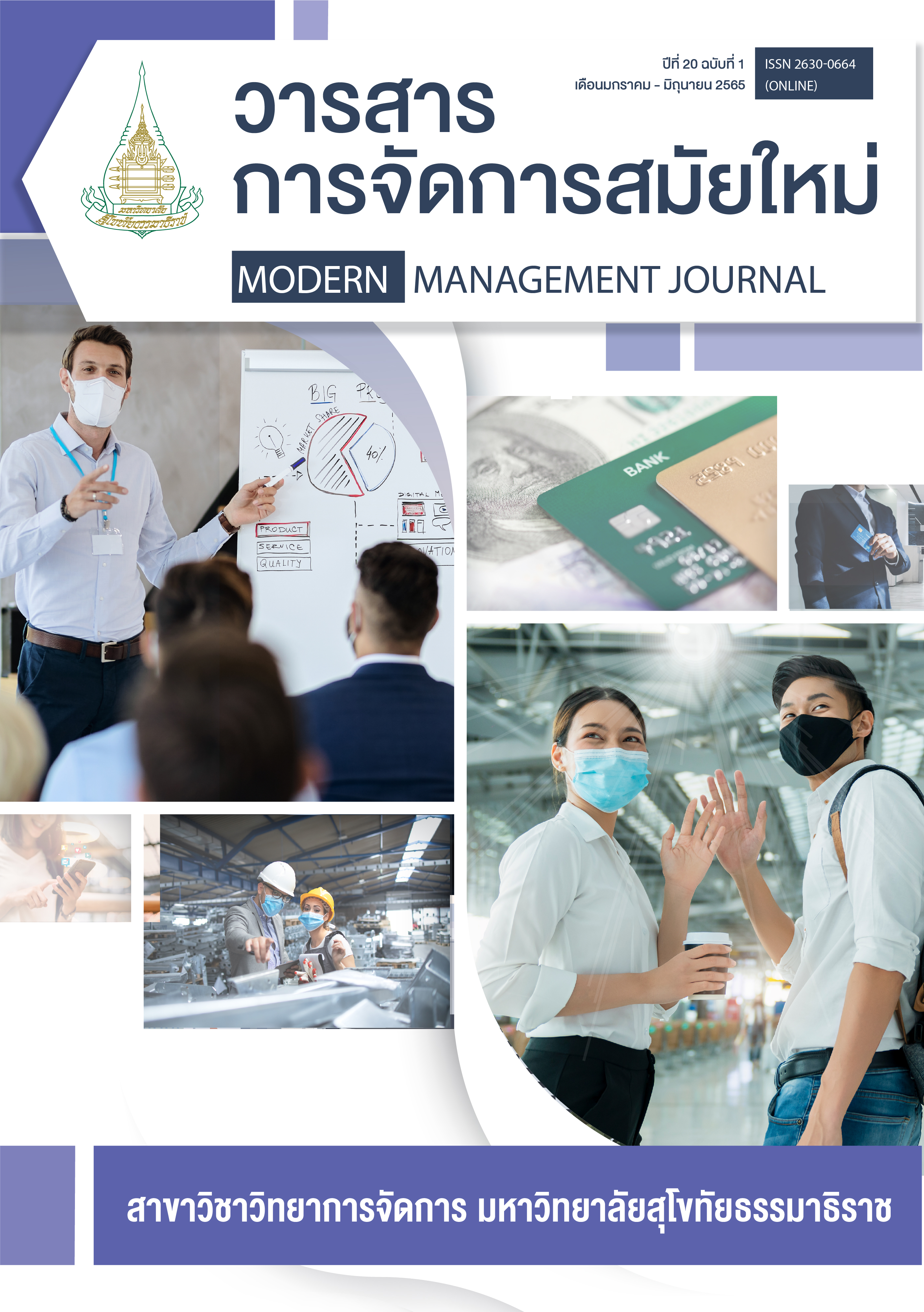กลยุทธ์การจัดการองค์ความรู้จากบุคลากรก่อนเกษียณสู่บุคลากรรุ่นใหม่
คำสำคัญ:
การจัดการองค์ความรู้, ผู้เกษียณอายุ, การถ่ายทอดองค์ความรู้บทคัดย่อ
การจัดการองค์ความรู้ภายในองค์กรถือเป็นกลยุทธ์สำคัญ ที่ส่งผลต่อความสามารถในการขับเคลื่อนองค์กรไปข้างหน้าอย่างรวดเร็ว ทว่าปัจจุบันองค์กรกำลังประสบปัญหาเกี่ยวกับการจัดเก็บองค์ความรู้ที่อยู่ในตัวบุคลากรเมื่อเกิดการเปลี่ยนแปลง เช่น การลาออกหรือการเกษียณอายุ จะส่งผลให้กระบวนการทำงานเกิดการหยุดชะงัก จากการไม่มีกลยุทธ์การจัดเก็บองค์ความรู้ที่เหมาะสม ดังนั้น บทความนี้จึงรวบรวมทฤษฎีที่สำคัญ และทบทวนวรรณกรรมที่เกี่ยวข้องกับการจัดการองค์ความรู้ในองค์กร เพื่อกำหนดกลยุทธ์การจัดการองค์ความรู้จากบุคลากรก่อนเกษียณสู่บุคลากรรุ่นใหม่ ได้แก่ กลยุทธ์การจัดลำดับความรู้ในองค์กร กลยุทธ์การจัดเก็บความรู้จากบุคลากร และกลยุทธ์การถ่ายทอดความรู้สู่บุคลากรในองค์กร เพื่อเป็นแนวทางให้องค์กรนำกลยุทธ์ไปประยุกต์ใช้กับการจัดการองค์ความรู้ภายในองค์กรให้ประสบผลสำเร็จและมีประสิทธิภาพสูงสุด
เอกสารอ้างอิง
Barroso, A. C. O., Reis-Junior, J. S. B., Monteiro, C. A., and Seary, A. (2010). Preservation of knowledge through networking with retirees. Procedia-Social and Behavioral Sciences, 2(4), 6475-6482.
Boonyakit, B., Prasopsuk Chokchai, N., Pornchanoknat, D., & Kannanuan, P. (2004). Knowledge management, from theory to practice. Bangkok: SE-EDUCATION.[In Thai]
Demarest, M. (1997). Understanding knowledge management. Long range planning, 30(3), 374-384. Department of Medical Sciences. (2015). Knowledge Management. Retrieved from http://www.dmsc.moph.go.th/audit/userfiles
/files/KnowledgeManagement.pdf [In Thai]
Distanont, A. (2016). Knowledge capture in weaning process. Suan Dusit Graduate School Academic Journal. 12(2), 201-218. [In Thai]
Distanont, A., Haapasalo, H., and Vaananen, M. (2014). Organising knowledge transfer in requirements engineering over organizational interfaces. International Journal of Innovation and Learning, 15(1), 41-64.
Klaysud, S., and Punpanich, N. (2020). The development model for knowledge management in Royal Thai Navy. Journal of Suvarnabhumi Institute of Technology (Humanities and Social Sciences), 6(1), 144-158. [In Thai]
Knowledge Management Sukhothai Thammathirat Open University. (2014). Knowledge of knowledge management. Retrieved from https://www.stou.ac.th/knowledgemanagement/knowdetail.asp?id=5 [In Thai]
Lombardo, M. M., and Eichinger, R. W. (2000). High potentials as high learners. Human Resource Management, 39(4), 321-329.
Masters, K. (2013). Edgar Dale's pyramid of learning in medical education: A literature review. Medical teacher, 35(11), e1584-e1593.
Michael, M. L. and Robert, W. E. (2010). The career architect development planner. 5th ed. Minneapolis, MN: Lominger International.
Nareerat, B. and Disalin, N. (2016). Telling knowledge management pre retire employee. Retrieved from http://kmintra.tistr.or.th/kmintra/?p=816
Nonaka, I., and Takeuchi, H. (1995). The knowledge-creating company: How Japanese companies create the dynamics of innovation. New York: Oxford university press.
Office of Knowledge Management and Development. (2016). What is the Knowledge Management? Retrieved from http://www.okmd.or.th/upload/pdf/chapter1_kc.pdf [In Thai]
Probst, G., Raub, S., and Romhardt, K. (2000). Managing knowledge: Building blocks for success (Vol. 360). Chichester: John Wiley & Sons.
Saeng - Alangkan, W. (2016). Coaching technique. Retrieved from https://www.ocsc.go.th/sites/default/files/document/ocsc-2017-eb12.pdf [In Thai]
Thanomkeaw, S., Leeben, Y. and Suttapong, K. (2016). Motivation strategies for each generation employees in the organization. Modern Management Journal. 14(1), 11-16.
Turban, A., and Aronson, J. E. Liang. (2005). Knowledge acquisition, representation, and reasoning. In P. Hall (Ed.), The scope and types of knowledge, 174-253.
Yamazaki, H. (2008). Open collectivism and knowledge communities in Japan. In Knowledge Management: Concepts, Methodologies, Tools, and Applications (pp. 1668-1671). IGI Global.
ดาวน์โหลด
เผยแพร่แล้ว
รูปแบบการอ้างอิง
ฉบับ
ประเภทบทความ
สัญญาอนุญาต
ลิขสิทธิ์ (c) 2022 วารสารการจัดการสมัยใหม่

อนุญาตภายใต้เงื่อนไข Creative Commons Attribution-NonCommercial-NoDerivatives 4.0 International License.



